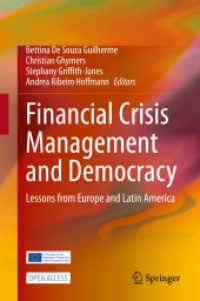- ホーム
- > 洋書
- > 英文書
- > Philosophy
基本説明
Takes into account history of scholarship, history of religious thought, history of scientific thought, besides history of philosophy.
Full Description
Even if specific pieces of research (on the sources or on individual authors, such as Pico, Agrippa, Erasmus, Montaigne, Sanches etc.) have given and are still producing significant results on Renaissance scepticism, an overall synthesis comprising the entire period has not been achieved yet.






